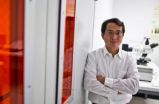Scientists reveal new insights into tendon injury
2011-03-02
(Press-News.org) Scientists have discovered how tendons – the fibrous tissue that connects muscle to bone – become damaged through injury or the ageing process in what could lead to new treatments for people with tendon problems.
The University of Manchester team, working with colleagues at Glasgow University, have been investigating 'adhesions', which are a build up of unwanted fibrous tissue on internal organs that have been damaged as a result of surgery or injury.
Adhesions cause organs to stick together and are extremely painful and distressing for patients, who often have to undergo surgery and rehabilitation. The estimated cost of adhesions to the NHS is £100 million each year.
In this study, published in the journal PLoS One, the researchers wanted to understand how tendon adhesions form, so examined the surface of healthy tendons and discovered that they are covered by a thin layer of skin.
"Tendons attach our muscles to bone and are essential for movement," said lead researcher Professor Karl Kadler, from the Wellcome Trust Centre for Cell Matrix Research in Manchester's Faculty of Life Sciences.
"In order to do this, tendons need to glide freely but when an adhesion forms the tendon can no longer travel over the bone, which causes pain, stiffness and reduced movement.
"We reasoned that the surface of tendons must contain a special cell that stops adhesions from forming in healthy people. We discovered that the tendon is actually covered by a thin layer of epithelial cells, which are usually found in skin.
"Undamaged tendons do not form adhesions but when the tendon 'skin' is damaged, the cells inside the tendon form an unwanted adhesion which begins to stick to nearby tissues."
The team were able to show that mice with defective cells at the surface of their tendons appeared to have difficulty walking and spontaneously develop tendon adhesions, even without surgery or injury.
Dr Susan Taylor, from The University of Manchester and co-author on the paper, added: "This study of tendon adhesions shows that the integrity of the surface of a tissue is critical in preventing adhesions. Furthermore, the discovery of this completely new layer of tendon cells changes the way we are thinking about how tendons are made during embryonic development and maintained in adulthood. Future research is aimed at finding ways of protecting the tendon epithelium in older people and in athletes."
###
Notes for editors:
A copy of the paper is available on request.
END
ELSE PRESS RELEASES FROM THIS DATE:
2011-03-02
Only in very few life phases do individuals face as many life transitions in such a short time as young adults at the age of 19-30. The transition from adolescence to adulthood is characterised by frequent changes in status or social roles, such as leaving the parental home, starting a career, entering into working life, forming a partnership and becoming a parent. Assuming civic and social responsibility is also an integral part of the lives of young adults at this particular life phase.
Professor Katariina Salmela-Aro's research team has investigated the transition ...
2011-03-02
Scientists have unravelled the shape of the protein that gives human tissues their elastic properties in what could lead to the development of new synthetic elastic polymers.
University of Manchester researchers, working with colleagues in Australia and the United States, used state-of-the-art techniques to reveal the structure of tropoelastin, the main component of elastin.
Elastin allows tissues in humans and other mammals to stretch, for example when the lungs expand and contract for respiration or when arteries widen and narrow over the course of a billion heart ...
2011-03-02
A spongy substance that could be mistaken for packing material has the nanotechnology world buzzing.
University of Central Florida Associate Professor Lei Zhai and postdoctoral associate Jianhua Zou have engineered the world's lightest carbon material in such a way that it could be used to detect pollutants and toxic substances, improve robotic surgery techniques and store energy more efficiently.
The new material belongs to the family of the lightest solid, also known by its technical name of aerogel or its common nickname of "frozen smoke."
Zhai's team worked with ...
2011-03-02
AMES, Iowa – Invasive plant species have long had a reputation as being bad for a new ecosystem when they are introduced.
Stan Harpole, assistant professor of ecology, evolution and organismal biology at Iowa State University, is founding organizer of a team of more than 70 researchers working at 65 sites worldwide that tested that assumption.
They wanted to know if it is true that problematic invasive species often spread widely in their new habitats because they don't encounter predators or diseases that help keep them in check in their home ranges.
"There is this ...
2011-03-02
Robotic surgery offers the same or better results than minimally invasive laparoscopic procedures for treating kidney disease, and can potentially help more patients because it is not as difficult for surgeons to learn, according to a new study led by Henry Ford Hospital specialists.
The findings come at a time both when chronic kidney disease is becoming more common, and while occult – or hidden – damage to kidney function has been overlooked in more than a fourth of patients with small kidney tumors, according to earlier studies.
This chronic renal insufficiency – ...
2011-03-02
This release is available in French.
Montreal, March 1, 2011 – Although Edith Piaf defiantly sang, "Non, je ne regrette rien," most people will have their share of regrets over their lifetime. Indeed, anyone who seeks to overcome disappointments should compare themselves to others who are worse off – rather than looking up to folks in more enviable positions – according to a new study from Concordia University. Published in the journal Personality and Social Psychology Bulletin, these findings have implications for both young and old.
"Our study examined how younger ...
2011-03-02
ATLANTA –March 1, 2011 – A new report from the American Cancer Society says a large proportion of the 141,000 cases and 49,000 deaths from colorectal cancer expected in the United States this year could be prevented by increasing the use of established screening tests and by applying existing knowledge about colorectal cancer prevention. The report, Colorectal Cancer Facts & Figures 2011-2013, released during National Colon Cancer Awareness Month, notes there has been substantial progress in the last decade reducing colorectal cancer incidence and death rates in most population ...
2011-03-02
Minneapolis/St. Paul (Mar. 1, 2011) – A five-year clinical trial led by University of Minnesota Medical School researchers has led to a new method of cardiopulmonary resuscitation (CPR) that improves long-term survival rates with good brain function by 50 percent.
The new technique goes beyond the standard hands-only compression-decompression method to include to two devices that increase blood circulation. Researchers found that the new device combination caused the heart and brain to receive nearly three times more blood flow during each compression-decompression ...
2011-03-02
ANN ARBOR, Mich. — Recent research suggests vitamin D may be able to stop or prevent cancer. Now, a new study finds an enzyme that plays a role in metabolizing vitamin D can predict lung cancer survival.
The study, from researchers at the University of Michigan Comprehensive Cancer Center, suggests that this enzyme stops the anti-cancer effects of vitamin D.
Levels of the enzyme, called CYP24A1, were elevated as much as 50 times in lung adenocarcinoma compared with normal lung tissue. The higher the level of CYP24A1, the more likely tumors were to be aggressive. About ...
2011-03-02
University Park, Pa. -- Free time is not always a fun time for people with autism. Giving them the power to choose their own leisure activities during free time, however, can boost their enjoyment, as well as improve communication and social skills, according to an international team of researchers.
"For many of us, we look at recreation as a time to spend on activities that are fun and that are designed for our enjoyment," said John Dattilo, professor, recreation, park and tourism management, Penn State. "But for some people with disabilities, particularly those who ...
LAST 30 PRESS RELEASES:
[Press-News.org] Scientists reveal new insights into tendon injury


